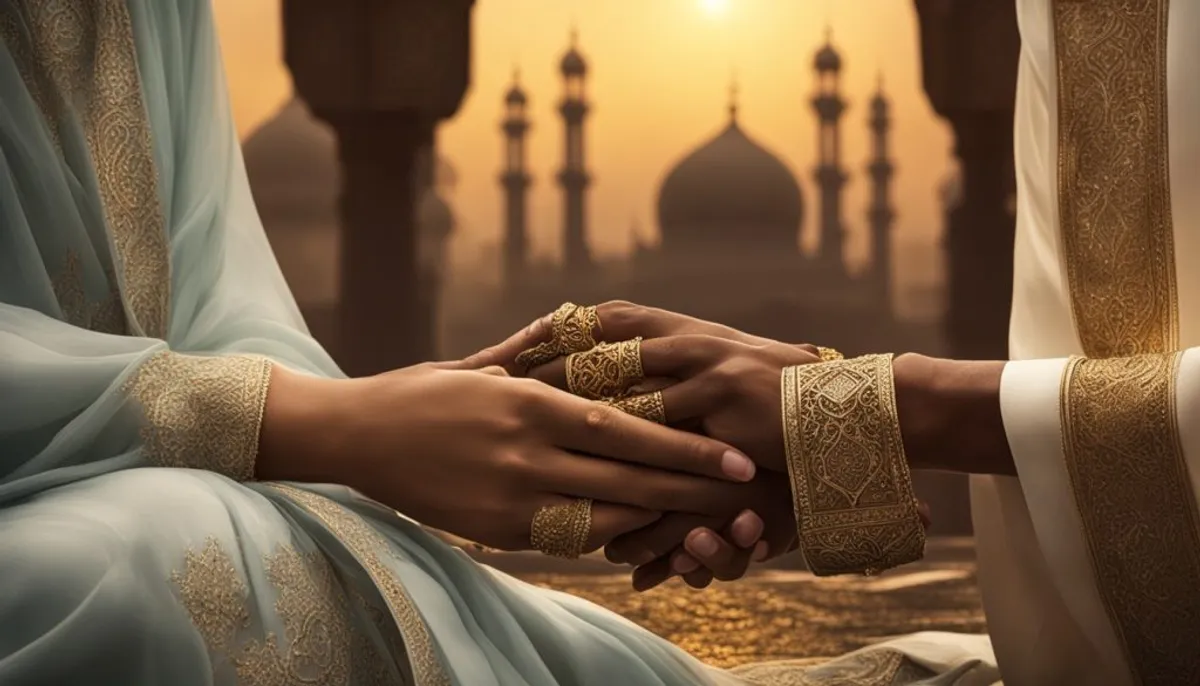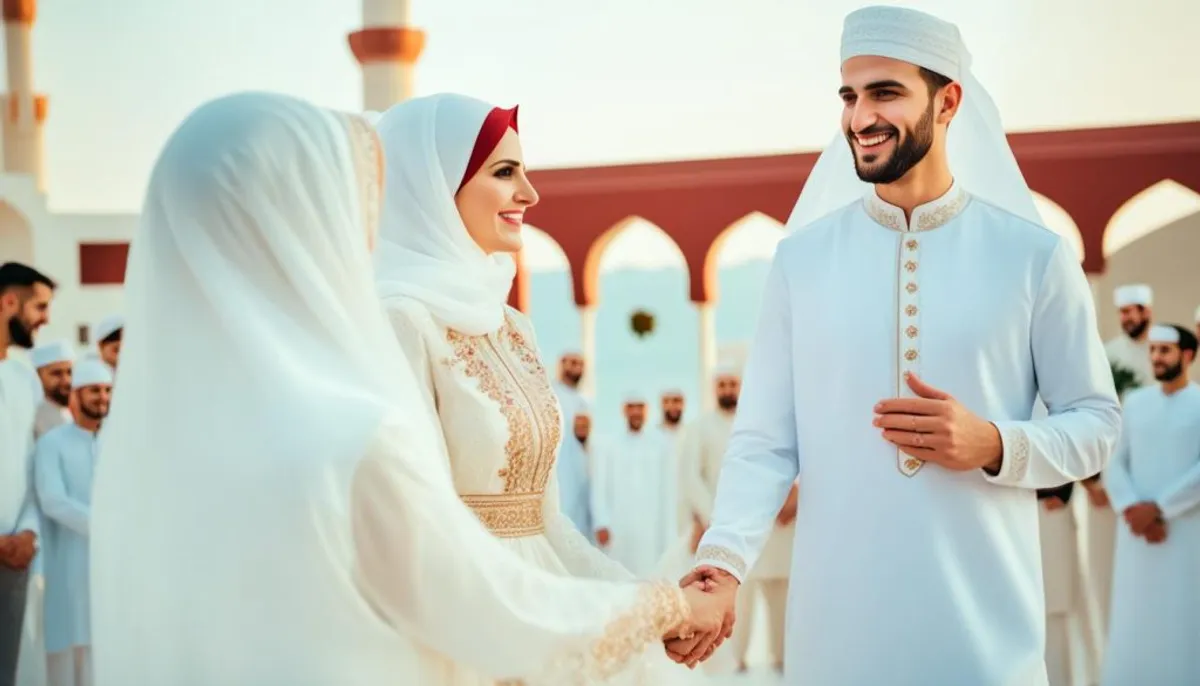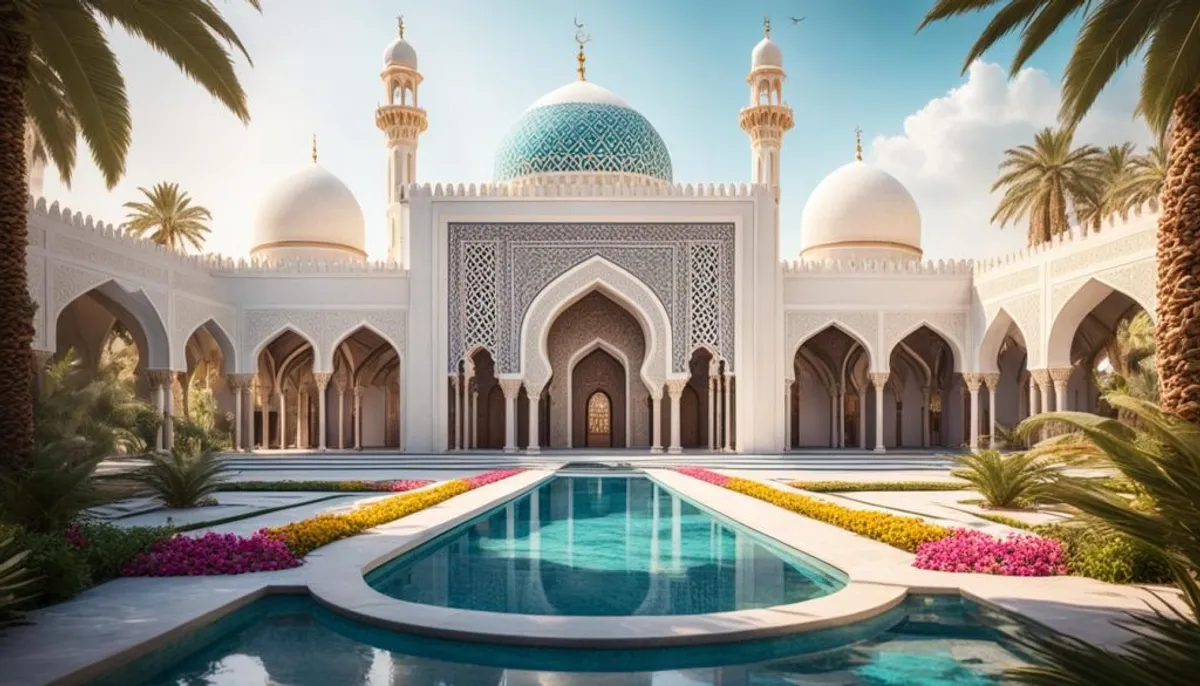Marriage is a sacred act in Islam, with its own customs and traditions. In many Muslim countries and communities, the process of Islamic marriage has several steps. These include khitbah (engagement), nikah (the formal, official, and legal marriage), rukhsati (the consummation of the marriage), and walimah (the marriage feast). Each step is important and has deep meaning.
It’s key to understand the importance of marriage in Islam and the guidelines for a valid Islamic marriage if you’re thinking about it. This guide will help you with the steps to get married in Islam. It covers the islamic nikah process and the islamic wedding traditions.

The Muslim Nikah: A Sacred Union
The Muslim Nikah is a sacred ritual in Islamic culture. It’s a marriage contract between two consenting Muslims, led by an Imam or scholar. This ceremony is more than a legal form. It’s a spiritual and social bond, showing the couple’s promise to love, honor, and respect each other.
Overview of the Muslim Nikah – What it is and What it Symbolizes
The Nikah is the legal marriage contract in Islam. It comes with a document that lists the rights and duties of both partners. The ceremony starts with a prayer for the couple, followed by a sermon on marriage’s importance in Islam.
This ceremony is key in Islamic culture. It teaches people to live together in peace and respect each other’s rights.
The islamic nikah shows the bond between two people and their strong connection. It’s about the couple’s promise to meet each other’s needs, be kind, and follow Islam’s teachings. The muslim nikah ceremony highlights the value of marriage in the islamic marriage contract and the islamic wedding rituals that celebrate the significance of nikah in islam.

The Nikah ceremony is a deep and sacred event. It marks the start of a new life for the couple. It’s a celebration of love, commitment, and the joining of two souls in God’s sight and their community.
The islamic nikah is a tradition that Muslims worldwide hold dear.
The Meaning Behind the Wording of the Muslim Nikah
The Muslim Nikah, or marriage contract, is a sacred union deeply rooted in Islamic tradition. The words and phrases used in this ceremony are very important. They show the spiritual and legal sides of marriage. By knowing the meaning of these wording, couples can better understand islamic marriage terminology and appreciate the significance of nikah contract terms.
One common arabic phrase in islamic marriage is Ismi, which means the groom’s full name. This shows the groom’s personal commitment and responsibility. The term Haqqi means the bride’s due or right. It makes sure her needs and wishes are known and respected in the marriage.
The phrase Liqa means the groom’s promise to never leave his wife. It highlights the commitment and loyalty expected in an Islamic marriage. Having a Wali, or guardian, for both parties shows the importance of family support and the community’s role in the marriage.
| Arabic Phrase | Meaning |
|---|---|
| Ismi | Groom’s full name |
| Haqqi | Bride’s due or right |
| Liqa | Groom’s vow to never desert his wife |
| Wali | Guardian or representative for both parties |
| Wahed | Unity of the couple |
| Mahr | Bride price or dowry |
| Rukhsa | Bride’s consent |
| Salaam | Symbolizing peace between the couple and their families |
By understanding the meaning of nikah wording, couples can see the significance of each word and phrase in a Muslim Nikah. This helps their marriage be based on Islamic values and reinforces the sacrament of matrimony as well as the sacred nature of the islamic marriage ceremony.
How to Marriage in Islam: Essential Requirements
For an Islamic Nikah ceremony to be valid, several essential elements must be met. Both parties must be willing, mature, and able to enter into a valid marriage contract under Islamic law. The ceremony also needs two witnesses who are respected in society. They will act as legal guardians for the couple if needed.
Before the ceremony, the couple must discuss and agree on financial terms. These include their rights and duties. A signed marriage contract by both parties makes the marriage legally binding under Islamic law. An Islamic cleric must be there to oversee and officiate the Nikah ceremony. They ensure all required elements are met.
The Must-Have Elements for a Valid Islamic Nikah Ceremony
- Willing, mature, and capable individuals with the capacity to enter into a valid Islamic marriage contract.
- Two witnesses who are respected members of society and will act as legal guardians for the couple.
- Discussed and agreed-upon financial agreements and terms, including the couple’s rights and obligations.
- A signed marriage contract by both parties to make the marriage legally binding under Islamic law.
- An Islamic cleric present to oversee and officiate the Nikah ceremony, ensuring all required elements are met.
- Recitation of Quranic verses and specific prayers as part of the religious elements.
- Pronouncement by the cleric that the couple is legally married in front of witnesses.
| Essential Elements | Description |
|---|---|
| Willing and Capable Individuals | Both parties must be willing, mature, and have the capacity to enter into a valid Islamic marriage contract. |
| Witnesses | Two respected members of society must be present as witnesses and legal guardians for the couple. |
| Financial Agreements | The couple’s rights, obligations, and financial terms must be discussed and agreed upon beforehand. |
| Signed Marriage Contract | A signed marriage contract by both parties is required to make the marriage legally binding under Islamic law. |
| Officiating Cleric | An Islamic cleric must be present to oversee and officiate the Nikah ceremony, ensuring all requirements are met. |
| Religious Elements | The ceremony must include the recitation of Quranic verses and specific prayers. |
| Legal Pronouncement | The cleric must pronounce the couple as legally married in front of witnesses. |
By ensuring these essential elements are present, the Islamic Nikah ceremony can be considered a valid and legally binding marriage under Islamic law.

Etiquette and Traditions for Islamic Marriage
When attending an Islamic Nikah ceremony, it’s important to follow certain rules. This shows respect for the couple and their families. Guests should dress modestly, covering their arms, legs, and hair. It’s also a custom to remove your shoes before entering as a sign of respect.
Be kind and quiet during the ceremony. Avoid making loud noises or causing trouble. Don’t bring gifts unless the couple or their families ask for them. Also, don’t take pictures unless you’re told it’s okay. These rules help make the Islamic marriage celebration happy and sacred.
RelatedRelated articles



